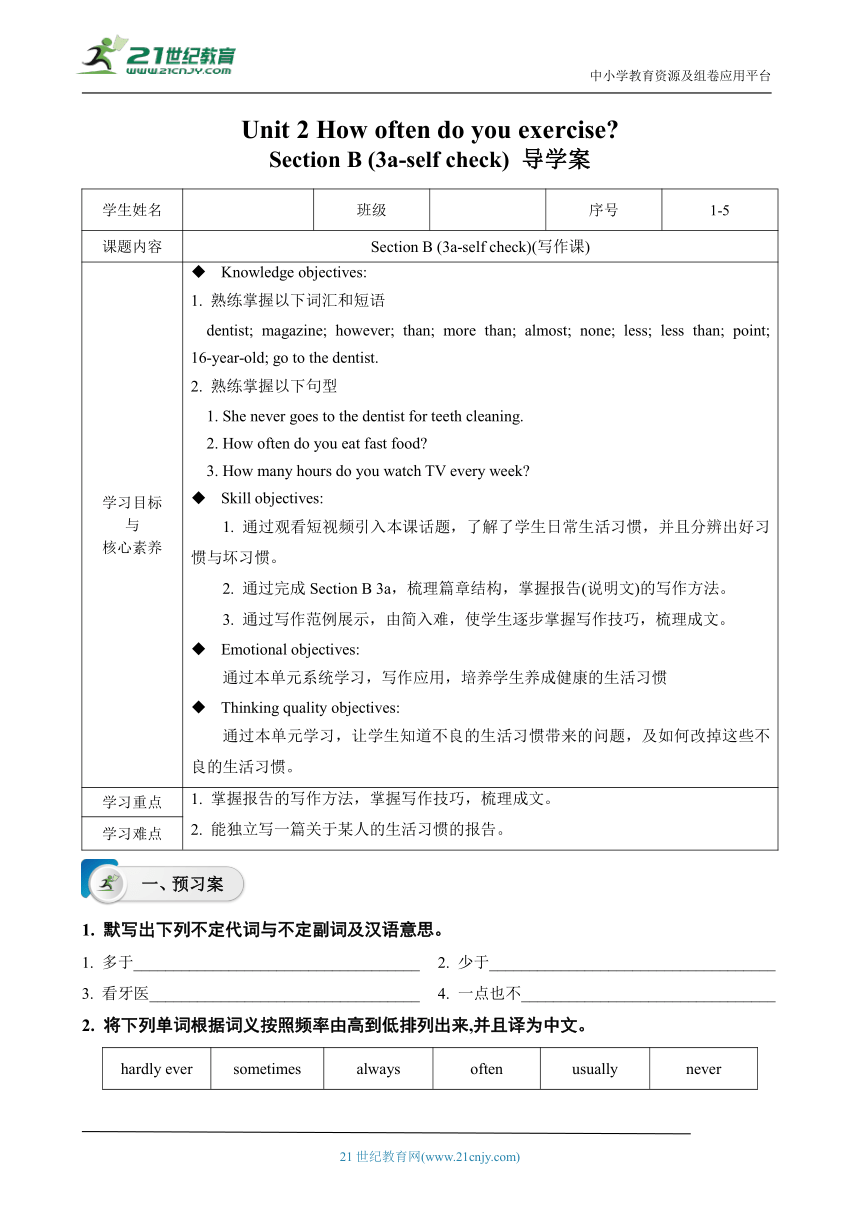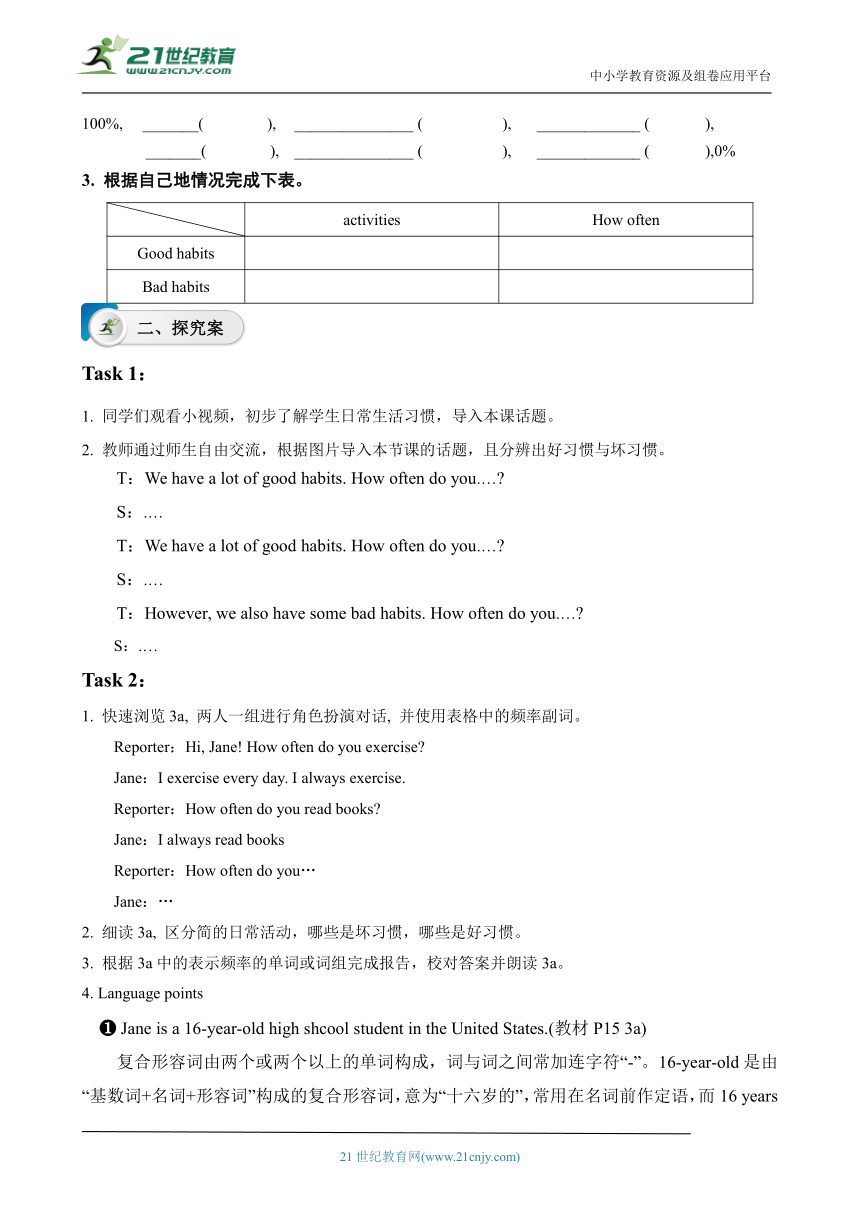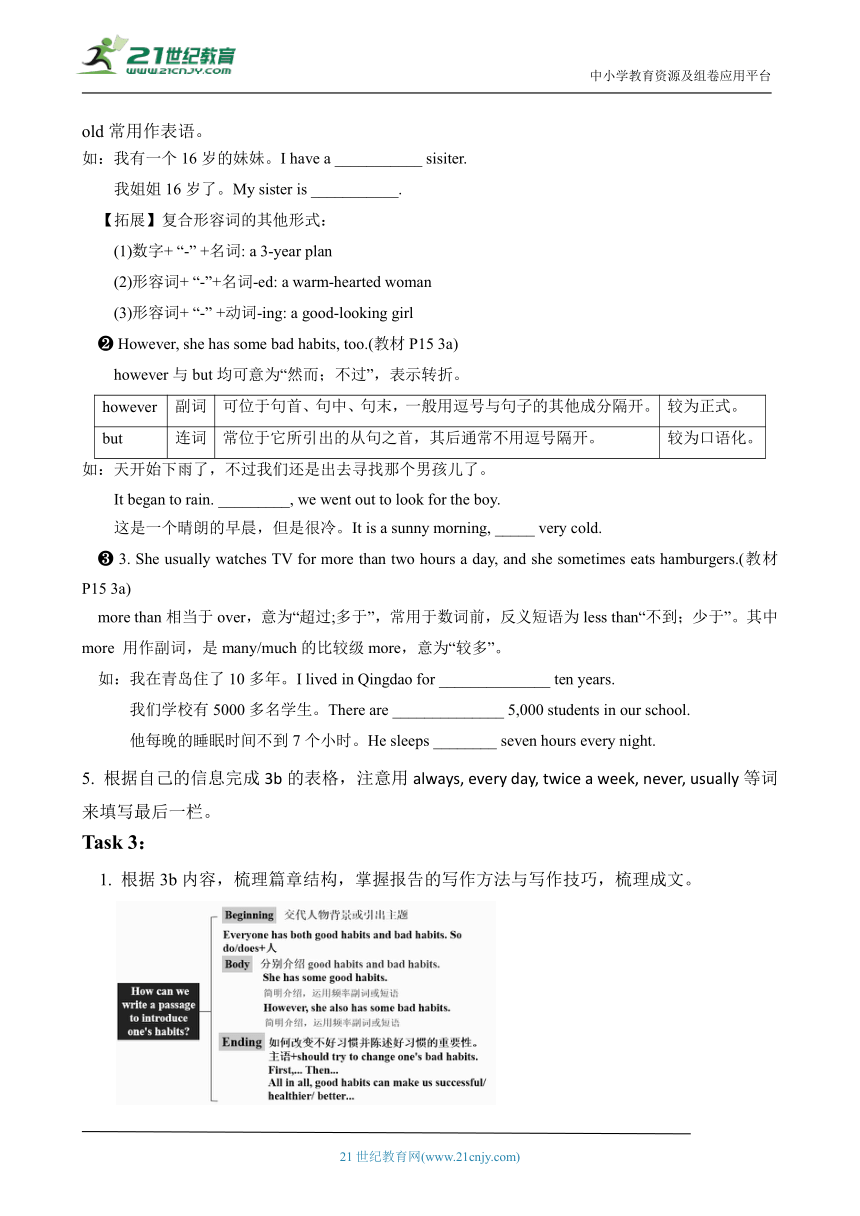【核心素养目标】Unit 2 How often do you exercise Section B 3a-self check 导学案
文档属性
| 名称 | 【核心素养目标】Unit 2 How often do you exercise Section B 3a-self check 导学案 |

|
|
| 格式 | docx | ||
| 文件大小 | 1.5MB | ||
| 资源类型 | 试卷 | ||
| 版本资源 | 人教新目标(Go for it)版 | ||
| 科目 | 英语 | ||
| 更新时间 | 2022-08-22 09:36:58 | ||
图片预览



文档简介
中小学教育资源及组卷应用平台
Unit 2 How often do you exercise
Section B (3a-self check) 导学案
学生姓名 班级 序号 1-5
课题内容 Section B (3a-self check)(写作课)
学习目标 与 核心素养 Knowledge objectives: 1. 熟练掌握以下词汇和短语 dentist; magazine; however; than; more than; almost; none; less; less than; point; 16-year-old; go to the dentist. 2. 熟练掌握以下句型 1. She never goes to the dentist for teeth cleaning. 2. How often do you eat fast food 3. How many hours do you watch TV every week Skill objectives: 1. 通过观看短视频引入本课话题,了解了学生日常生活习惯,并且分辨出好习惯与坏习惯。 2. 通过完成Section B 3a,梳理篇章结构,掌握报告(说明文)的写作方法。 3. 通过写作范例展示,由简入难,使学生逐步掌握写作技巧,梳理成文。 Emotional objectives: 通过本单元系统学习,写作应用,培养学生养成健康的生活习惯 Thinking quality objectives: 通过本单元学习,让学生知道不良的生活习惯带来的问题,及如何改掉这些不良的生活习惯。
学习重点 掌握报告的写作方法,掌握写作技巧,梳理成文。 能独立写一篇关于某人的生活习惯的报告。
学习难点
1. 默写出下列不定代词与不定副词及汉语意思。
多于____________________________________ 少于____________________________________
看牙医__________________________________ 一点也不________________________________
将下列单词根据词义按照频率由高到低排列出来,并且译为中文。
hardly ever sometimes always often usually never
100%, _______( ), _______________ ( ), _____________ ( ),
_______( ), _______________ ( ), _____________ ( ),0%
3. 根据自己地情况完成下表。
activities How often
Good habits
Bad habits
Task 1:
1. 同学们观看小视频,初步了解学生日常生活习惯,导入本课话题。
2. 教师通过师生自由交流,根据图片导入本节课的话题,且分辨出好习惯与坏习惯。
T:We have a lot of good habits. How often do you.…
S:.…
T:We have a lot of good habits. How often do you.…
S:.…
T:However, we also have some bad habits. How often do you.…
S:.…
Task 2:
1. 快速浏览3a, 两人一组进行角色扮演对话, 并使用表格中的频率副词。
Reporter:Hi, Jane! How often do you exercise
Jane:I exercise every day. I always exercise.
Reporter:How often do you read books
Jane:I always read books
Reporter:How often do you…
Jane:…
2. 细读3a, 区分简的日常活动,哪些是坏习惯,哪些是好习惯。
3. 根据3a中的表示频率的单词或词组完成报告,校对答案并朗读3a。
4. Language points
Jane is a 16-year-old high shcool student in the United States.(教材P15 3a)
复合形容词由两个或两个以上的单词构成,词与词之间常加连字符“-”。16-year-old是由“基数词+名词+形容词”构成的复合形容词,意为“十六岁的”,常用在名词前作定语,而16 years old常用作表语。
如:我有一个16岁的妹妹。I have a ___________ sisiter.
我姐姐16岁了。My sister is ___________.
【拓展】复合形容词的其他形式:
(1)数字+ “-” +名词: a 3-year plan
(2)形容词+ “-”+名词-ed: a warm-hearted woman
(3)形容词+ “-” +动词-ing: a good-looking girl
However, she has some bad habits, too.(教材P15 3a)
however与but均可意为“然而;不过”,表示转折。
however 副词 可位于句首、句中、句末,一般用逗号与句子的其他成分隔开。 较为正式。
but 连词 常位于它所引出的从句之首,其后通常不用逗号隔开。 较为口语化。
如:天开始下雨了,不过我们还是出去寻找那个男孩儿了。
It began to rain. _________, we went out to look for the boy.
这是一个晴朗的早晨,但是很冷。It is a sunny morning, _____ very cold.
3. She usually watches TV for more than two hours a day, and she sometimes eats hamburgers.(教材P15 3a)
more than相当于over,意为“超过;多于”,常用于数词前,反义短语为less than“不到;少于”。其中more 用作副词,是many/much的比较级more,意为“较多”。
如:我在青岛住了10多年。I lived in Qingdao for ______________ ten years.
我们学校有5000多名学生。There are ______________ 5,000 students in our school.
他每晚的睡眠时间不到7个小时。He sleeps ________ seven hours every night.
5. 根据自己的信息完成3b的表格,注意用always, every day, twice a week, never, usually等词来填写最后一栏。
Task 3:
1. 根据3b内容,梳理篇章结构,掌握报告的写作方法与写作技巧,梳理成文。
2. Start your writing!
写一篇关于你的好习惯和坏习惯的报告,然后学生相互交流纠正错误。教师抽查点评,完成3c。
3. 完成第4部分选择题。
4. Language points
Almost every day. (教材P16 4)
(1) almost 常用来表示程度,意为“几乎;差不多”,同义词是nearly。
如:我几乎听到了所有关于他的故事。I heard _______ all the stories about him.
今天,几乎每个人都有一部智能手机。Today, _______ everyone has a smart phone.
(2) almost可与never,、no、 none、 nothing等词连用,但不能与_____连用。
如:我的朋友们几乎从不去健身房。My friends _______ never went to gym.
None/n n/ pron.没有一个 (教材P16 4)
【易混辨析】none与no one
none 意为“没有一个” 即可指人, 也可指物。 通常与of短语连用,作主语时,谓语动词既可用单数,也可用复数。 常用来回答how many或how much(提问价格的情况除外)引导的特殊疑问句。
no one 意为“没有人” 只能指人 不能与of短语连用,作主语时,谓语动词用单数。 常用来回答 who引导的特殊疑问句。
如:我尝试了许多不同的方法,但都没有成功。
I tried many different ways of doing it, but ______ them _____ successful.
萨姆的历史老师问了他一些问题。然而,他的回答没有一个是正确的。
Sam's history teacher was asking him some questions. However, _______ his answers ______ correct.
将近15分钟,但没有人能找到合适的。
It was almost 15 minutes but ______ was able to find the right one.
Task 4:
让学生完成Self Check并核对答案。
1. 根据句意及所给汉语提示填写单词。
Tom likes reading __________(杂志)because he can learn a lot from them.
He __________(指)to the house far away and said, “That's my home.”
I don't feel well and I have to go to the __________(牙医)tomorrow.
Let’s eat now and __________(可能)we could catch a movie later.
The problem is so easy that __________(几乎)anyone can do it.
2. 选词填空。
Lily __________(always/sometimes) comes to school on time and she’s never late.
Jim __________(usually/never) rides to school, but yesterday he took a bus to school.
He dislikes playing basketball, so he __________(always/hardly ever) plays it
Mike sometimes has lunch at home, and __________(never/sometimes) he eats it at school.
—How much milk did you put in the coffee
—__________. I don’t like milk at all. (none/no one)
__________ helped me clean my room. I did it by myself. (none/no one)
We couldn’t buy anything because __________of the shops were open. (none/no one)
Look left and right before you go __________the street.(through/across/over)
The workers are building a bridge __________the river.(through/across/over)
I left my keys in the room. I’ll have to get in __________ the window.(through/across/over)
3. 书面表达。
疫情期间,停课不停学。在家上网课的日子里,你的朋友Bob 养成了一些习惯。请写一篇文章介绍他的这些习惯并为他提一些建议。
好习惯 坏习惯
总是按时完成作业 每天都上网络娱乐
一周至少锻炼5次 有时熬夜
经常帮父母做家务 一周吃四次垃圾食品
________________________________________________________________________________
________________________________________________________________________________
________________________________________________________________________________
________________________________________________________________________________
________________________________________________________________________________
________________________________________________________________________________
________________________________________________________________________________
________________________________________________________________________________
________________________________________________________________________________
训练案答案
1. 根据句意及所给汉语提示填写单词。
magazines pointed dentist maybe almost
2. 选词填空。
always usually hardly ever sometimes None
No one none across over through
3. 书面表达。
Everybody has both good habits and bad habits, so does Bob.
He has some good habits. He always finishes his homework on time and he exercises at least 5 times a week. Also, he often helps his parents with housework. However, he has some had habits, too. He uses the Internet for fun every day, He sometimes stays up late and he eats junk food four times a week.
I think it's time to change his bad habits. First, he should use the Internet for study, Second, it’s important to go to bed early. Third, we should eat more healthy food. All in all, it's never to late to develop good habits.
21世纪教育网 www.21cnjy.com 精品试卷·第 2 页 (共 2 页)
21世纪教育网(www.21cnjy.com)
Unit 2 How often do you exercise
Section B (3a-self check) 导学案
学生姓名 班级 序号 1-5
课题内容 Section B (3a-self check)(写作课)
学习目标 与 核心素养 Knowledge objectives: 1. 熟练掌握以下词汇和短语 dentist; magazine; however; than; more than; almost; none; less; less than; point; 16-year-old; go to the dentist. 2. 熟练掌握以下句型 1. She never goes to the dentist for teeth cleaning. 2. How often do you eat fast food 3. How many hours do you watch TV every week Skill objectives: 1. 通过观看短视频引入本课话题,了解了学生日常生活习惯,并且分辨出好习惯与坏习惯。 2. 通过完成Section B 3a,梳理篇章结构,掌握报告(说明文)的写作方法。 3. 通过写作范例展示,由简入难,使学生逐步掌握写作技巧,梳理成文。 Emotional objectives: 通过本单元系统学习,写作应用,培养学生养成健康的生活习惯 Thinking quality objectives: 通过本单元学习,让学生知道不良的生活习惯带来的问题,及如何改掉这些不良的生活习惯。
学习重点 掌握报告的写作方法,掌握写作技巧,梳理成文。 能独立写一篇关于某人的生活习惯的报告。
学习难点
1. 默写出下列不定代词与不定副词及汉语意思。
多于____________________________________ 少于____________________________________
看牙医__________________________________ 一点也不________________________________
将下列单词根据词义按照频率由高到低排列出来,并且译为中文。
hardly ever sometimes always often usually never
100%, _______( ), _______________ ( ), _____________ ( ),
_______( ), _______________ ( ), _____________ ( ),0%
3. 根据自己地情况完成下表。
activities How often
Good habits
Bad habits
Task 1:
1. 同学们观看小视频,初步了解学生日常生活习惯,导入本课话题。
2. 教师通过师生自由交流,根据图片导入本节课的话题,且分辨出好习惯与坏习惯。
T:We have a lot of good habits. How often do you.…
S:.…
T:We have a lot of good habits. How often do you.…
S:.…
T:However, we also have some bad habits. How often do you.…
S:.…
Task 2:
1. 快速浏览3a, 两人一组进行角色扮演对话, 并使用表格中的频率副词。
Reporter:Hi, Jane! How often do you exercise
Jane:I exercise every day. I always exercise.
Reporter:How often do you read books
Jane:I always read books
Reporter:How often do you…
Jane:…
2. 细读3a, 区分简的日常活动,哪些是坏习惯,哪些是好习惯。
3. 根据3a中的表示频率的单词或词组完成报告,校对答案并朗读3a。
4. Language points
Jane is a 16-year-old high shcool student in the United States.(教材P15 3a)
复合形容词由两个或两个以上的单词构成,词与词之间常加连字符“-”。16-year-old是由“基数词+名词+形容词”构成的复合形容词,意为“十六岁的”,常用在名词前作定语,而16 years old常用作表语。
如:我有一个16岁的妹妹。I have a ___________ sisiter.
我姐姐16岁了。My sister is ___________.
【拓展】复合形容词的其他形式:
(1)数字+ “-” +名词: a 3-year plan
(2)形容词+ “-”+名词-ed: a warm-hearted woman
(3)形容词+ “-” +动词-ing: a good-looking girl
However, she has some bad habits, too.(教材P15 3a)
however与but均可意为“然而;不过”,表示转折。
however 副词 可位于句首、句中、句末,一般用逗号与句子的其他成分隔开。 较为正式。
but 连词 常位于它所引出的从句之首,其后通常不用逗号隔开。 较为口语化。
如:天开始下雨了,不过我们还是出去寻找那个男孩儿了。
It began to rain. _________, we went out to look for the boy.
这是一个晴朗的早晨,但是很冷。It is a sunny morning, _____ very cold.
3. She usually watches TV for more than two hours a day, and she sometimes eats hamburgers.(教材P15 3a)
more than相当于over,意为“超过;多于”,常用于数词前,反义短语为less than“不到;少于”。其中more 用作副词,是many/much的比较级more,意为“较多”。
如:我在青岛住了10多年。I lived in Qingdao for ______________ ten years.
我们学校有5000多名学生。There are ______________ 5,000 students in our school.
他每晚的睡眠时间不到7个小时。He sleeps ________ seven hours every night.
5. 根据自己的信息完成3b的表格,注意用always, every day, twice a week, never, usually等词来填写最后一栏。
Task 3:
1. 根据3b内容,梳理篇章结构,掌握报告的写作方法与写作技巧,梳理成文。
2. Start your writing!
写一篇关于你的好习惯和坏习惯的报告,然后学生相互交流纠正错误。教师抽查点评,完成3c。
3. 完成第4部分选择题。
4. Language points
Almost every day. (教材P16 4)
(1) almost 常用来表示程度,意为“几乎;差不多”,同义词是nearly。
如:我几乎听到了所有关于他的故事。I heard _______ all the stories about him.
今天,几乎每个人都有一部智能手机。Today, _______ everyone has a smart phone.
(2) almost可与never,、no、 none、 nothing等词连用,但不能与_____连用。
如:我的朋友们几乎从不去健身房。My friends _______ never went to gym.
None/n n/ pron.没有一个 (教材P16 4)
【易混辨析】none与no one
none 意为“没有一个” 即可指人, 也可指物。 通常与of短语连用,作主语时,谓语动词既可用单数,也可用复数。 常用来回答how many或how much(提问价格的情况除外)引导的特殊疑问句。
no one 意为“没有人” 只能指人 不能与of短语连用,作主语时,谓语动词用单数。 常用来回答 who引导的特殊疑问句。
如:我尝试了许多不同的方法,但都没有成功。
I tried many different ways of doing it, but ______ them _____ successful.
萨姆的历史老师问了他一些问题。然而,他的回答没有一个是正确的。
Sam's history teacher was asking him some questions. However, _______ his answers ______ correct.
将近15分钟,但没有人能找到合适的。
It was almost 15 minutes but ______ was able to find the right one.
Task 4:
让学生完成Self Check并核对答案。
1. 根据句意及所给汉语提示填写单词。
Tom likes reading __________(杂志)because he can learn a lot from them.
He __________(指)to the house far away and said, “That's my home.”
I don't feel well and I have to go to the __________(牙医)tomorrow.
Let’s eat now and __________(可能)we could catch a movie later.
The problem is so easy that __________(几乎)anyone can do it.
2. 选词填空。
Lily __________(always/sometimes) comes to school on time and she’s never late.
Jim __________(usually/never) rides to school, but yesterday he took a bus to school.
He dislikes playing basketball, so he __________(always/hardly ever) plays it
Mike sometimes has lunch at home, and __________(never/sometimes) he eats it at school.
—How much milk did you put in the coffee
—__________. I don’t like milk at all. (none/no one)
__________ helped me clean my room. I did it by myself. (none/no one)
We couldn’t buy anything because __________of the shops were open. (none/no one)
Look left and right before you go __________the street.(through/across/over)
The workers are building a bridge __________the river.(through/across/over)
I left my keys in the room. I’ll have to get in __________ the window.(through/across/over)
3. 书面表达。
疫情期间,停课不停学。在家上网课的日子里,你的朋友Bob 养成了一些习惯。请写一篇文章介绍他的这些习惯并为他提一些建议。
好习惯 坏习惯
总是按时完成作业 每天都上网络娱乐
一周至少锻炼5次 有时熬夜
经常帮父母做家务 一周吃四次垃圾食品
________________________________________________________________________________
________________________________________________________________________________
________________________________________________________________________________
________________________________________________________________________________
________________________________________________________________________________
________________________________________________________________________________
________________________________________________________________________________
________________________________________________________________________________
________________________________________________________________________________
训练案答案
1. 根据句意及所给汉语提示填写单词。
magazines pointed dentist maybe almost
2. 选词填空。
always usually hardly ever sometimes None
No one none across over through
3. 书面表达。
Everybody has both good habits and bad habits, so does Bob.
He has some good habits. He always finishes his homework on time and he exercises at least 5 times a week. Also, he often helps his parents with housework. However, he has some had habits, too. He uses the Internet for fun every day, He sometimes stays up late and he eats junk food four times a week.
I think it's time to change his bad habits. First, he should use the Internet for study, Second, it’s important to go to bed early. Third, we should eat more healthy food. All in all, it's never to late to develop good habits.
21世纪教育网 www.21cnjy.com 精品试卷·第 2 页 (共 2 页)
21世纪教育网(www.21cnjy.com)
同课章节目录
- Unit 1 Where did you go on vacation?
- Section A
- Section B
- Unit 2 How often do you exercise?
- Section A
- Section B
- Unit 3 I'm more outgoing than my sister.
- Section A
- Section B
- Unit 4 What's the best movie theater?
- Section A
- Section B
- Unit 5 Do you want to watch a game show?
- Section A
- Section B
- Unit 6 I'm going to study computer science.
- Section A
- Section B
- Unit 7 Will people have robots?
- Section A
- Section B
- Unit 8 How do you make a banana milk shake?
- Section A
- Section B
- Unit 9 Can you come to my party?
- Section A
- Section B
- Unit 10 If you go to the party, you'll have a grea
- Section A
- Section B
